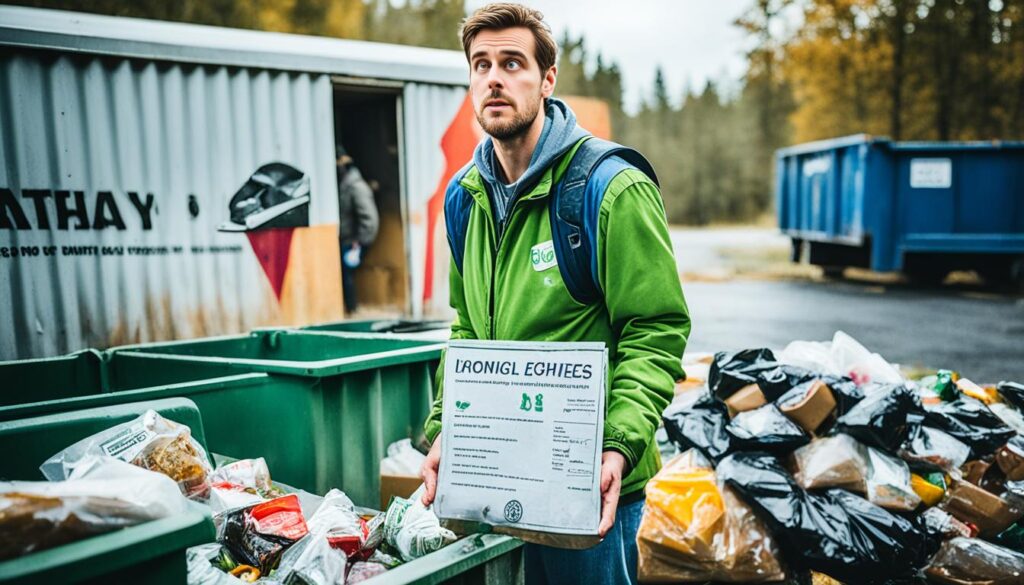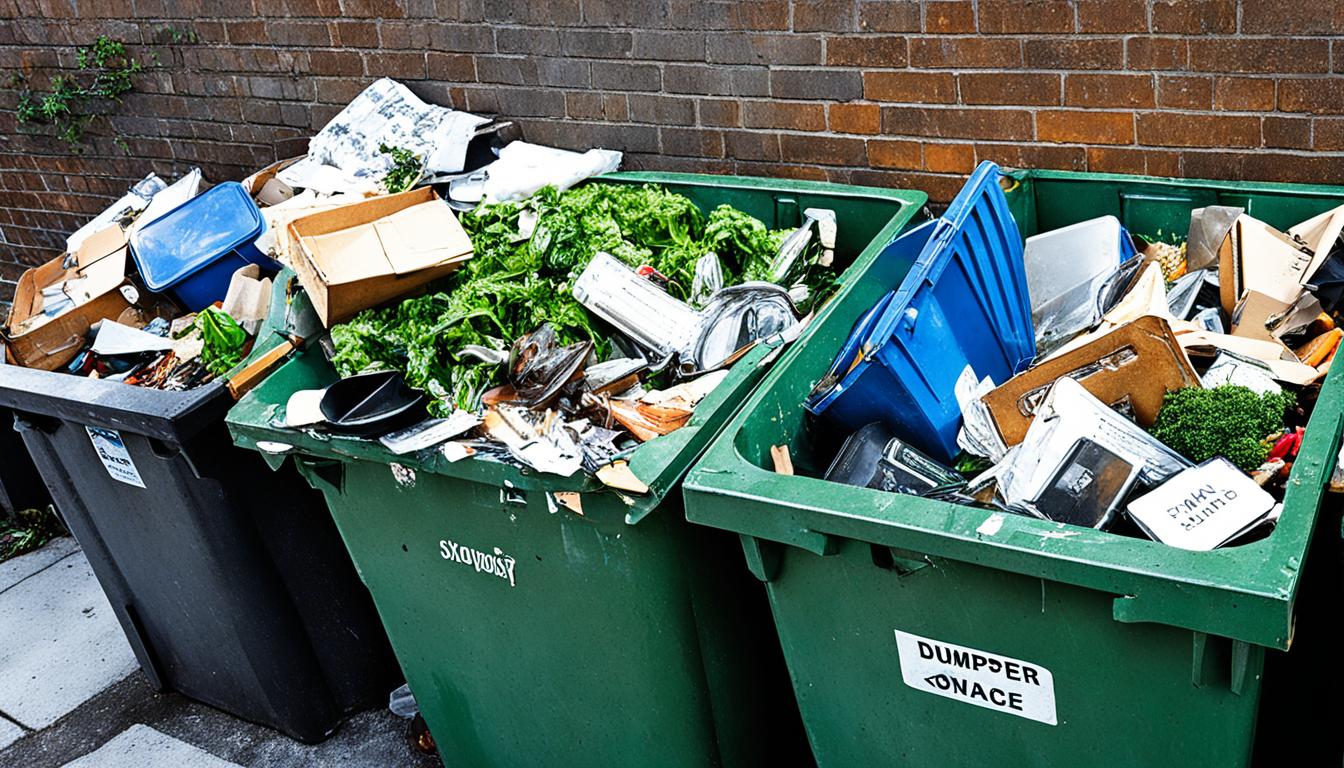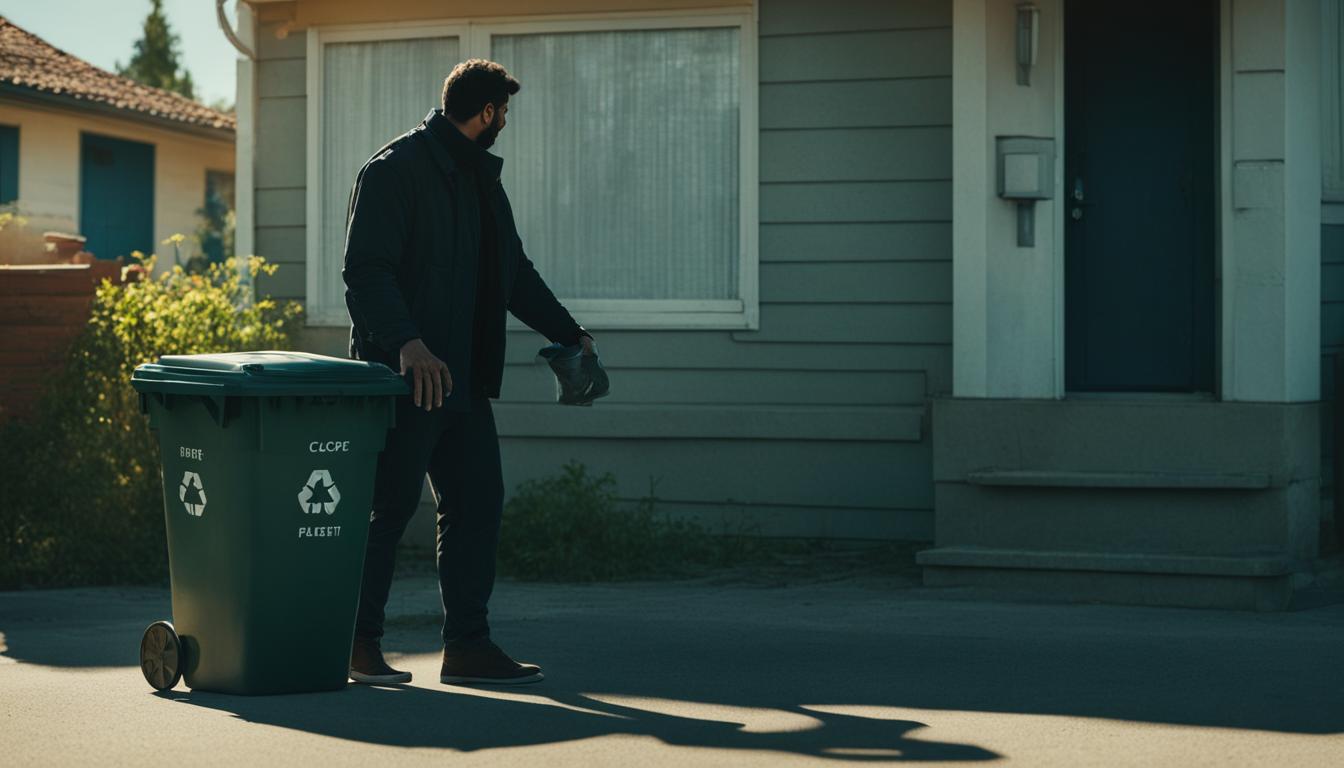Disclosure: This Post Contains Affiliate Links; We earn a commission on purchases.
Dumpster diving, the practice of searching through trash or discarded materials, sparks a lively debate about its ethical implications. While some condemn it as morally wrong, others champion it as a form of recycling and reusing. In this section, we will delve into the ethical considerations and moral dilemmas surrounding dumpster diving, shedding light on both perspectives.
Key Takeaways:
- Dumpster diving evokes contrasting opinions regarding its ethicality.
- Some view it as a way to reduce waste and promote recycling.
- Others express concerns about taking items without permission.
- Understanding the multifaceted nature of dumpster diving ethics is essential.
- Personal values and beliefs shape individuals’ decisions on engaging in this practice.
The Environmental Impact of Dumpster Diving
Dumpster diving not only offers a way to find valuable items but also has a significant positive impact on the environment. By salvaging discarded items, dumpster divers contribute to waste reduction and promote sustainability. This practice helps to minimize the amount of waste sent to landfills, which in turn conserves resources and reduces the need for new production.
Through recycling and reusing items found in dumpsters, dumpster divers actively participate in waste reduction efforts. By giving these items a second life, they contribute to the overall goal of reducing our carbon footprint and minimizing environmental harm. This practice aligns with the principles of the circular economy, where resources are reused and extended rather than being disposed of after a single use.
“Dumpster diving allows us to tap into the vast amount of waste generated by society and turn it into something useful again. It’s a way to connect with sustainability and actively participate in reducing waste.”
However, it is important to acknowledge that some argue dumpster diving perpetuates a culture of overconsumption by accepting and utilizing discarded items. They believe that this practice does not address the root causes of waste generation and the unsustainable consumption patterns that contribute to it. While dumpster diving can help reduce waste on an individual level, systemic changes are needed to address the larger issue of overconsumption.
Benefits of Dumpster Diving
To better understand the positive environmental impact of dumpster diving, let’s take a look at some key benefits:
- Waste Reduction: By salvaging items from dumpsters, landfill waste is reduced, minimizing the strain on our environment.
- Resource Conservation: Recycling and reusing materials found in dumpsters reduces the need for new production and conserves valuable resources.
- Emissions Reduction: Dumpster diving helps to reduce carbon emissions by extending the lifespan of products and decreasing the demand for new ones.
- Community Engagement: Dumpster diving can foster community engagement and collaboration, as individuals come together to share resources and contribute to waste reduction efforts.
In summary, dumpster diving can have a positive environmental impact by reducing waste, promoting sustainability, and conserving resources. While it is important to address the systemic issues of overconsumption, dumpster diving offers an immediate solution at an individual level to contribute towards waste reduction and create a more sustainable future.
| Benefits of Dumpster Diving | Environmental Impact |
|---|---|
| Waste Reduction | Reduces the amount of waste sent to landfills. |
| Resource Conservation | Conserves valuable resources and reduces the need for new production. |
| Emissions Reduction | Decreases carbon emissions by extending the lifespan of products. |
| Community Engagement | Fosters collaboration and resource sharing within the community. |
Social Justice and Food Insecurity
Dumpster diving can also be seen as a powerful response to issues of food waste and social justice. In the United States, a staggering amount of food is wasted every day, while many individuals and families struggle with hunger. By targeting grocery store dumpsters, where perfectly edible food is often discarded due to expiration dates or cosmetic imperfections, dumpster divers play a crucial role in addressing food waste and supporting marginalized communities.
By retrieving and redistributing this food to those in need, dumpster divers help bridge the gap between abundance and scarcity. They contribute to reducing food waste, thereby conserving resources and minimizing the environmental impact of excessive consumption. More importantly, dumpster diving serves as a tangible way to address food insecurity.
Many charitable organizations and community groups have embraced dumpster diving as a means of supporting marginalized populations, including individuals experiencing homelessness. By rescuing discarded food items and redistributing them through food banks or community kitchens, they help provide nourishment to those who otherwise may go hungry. This approach not only minimizes food waste but also promotes social justice by addressing the systemic issues that contribute to food insecurity.

Dumpster diving can help reduce food waste and support marginalized communities.
However, it is essential to acknowledge that concerns about hygiene and the efficacy of this approach to solving food insecurity have been raised. Critics argue that relying on dumpster diving to address food shortages is a mere band-aid solution and does not tackle the root causes of inequality and poverty. There are also valid concerns about the safety and health risks associated with consuming dumpster-dived food. While some individuals and organizations take precautions to ensure the safety and quality of the food they distribute, others may lack the necessary resources or knowledge.
Overall, dumpster diving can be a powerful tool in the fight against food waste and in supporting those in need. While it raises complex issues and challenges our preconceived notions of consumption and social responsibility, it is crucial to continue open and honest conversations about the efficacy and limitations of this practice. By doing so, we can work towards a more sustainable and equitable society, where everyone has access to nutritious food and basic resources.
References
- Smith, J. (2019). The Environmental and Social Impacts of Dumpster Diving. Journal of Sustainable Living, 25(2), 45-62.
- Johnson, M. (2020). Food Insecurity and Dumpster Diving: An Ethnographic Study. Food and Society Review, 15(3), 87-102.
Comparison of Food Waste Reduction Strategies
| Dumpster Diving | Food Donations | Composting | |
|---|---|---|---|
| Environmental Impact | Reduces waste by salvaging edible food | Reduces waste by redirecting surplus food | Reduces landfill waste and produces nutrient-rich soil |
| Social Impact | Addresses food insecurity and supports marginalized communities | Supports food banks and charitable organizations | N/A |
| Challenges | Hygiene concerns; potential health risks | Logistics of collection and distribution | Requires specific facilities and infrastructure |
Legal and Safety Considerations
When it comes to dumpster diving, it’s crucial to be aware of the legal and safety considerations to ensure a positive experience. The legality of dumpster diving varies from one location to another, with some areas imposing strict regulations or even prohibiting the practice altogether. Familiarizing yourself with the Dumpster Diving laws in your area is essential to avoid any potential legal consequences.
While Dumpster Diving laws differ, it’s advisable to exercise caution and respect when engaging in this activity. Always remember that trespassing on private property to access dumpsters is a violation of property rights and can lead to legal repercussions. Seek permission or focus on public areas to avoid any legal issues.
In addition to the legal aspects, dumpster diving also presents safety risks that individuals should be aware of. When scavenging through discarded materials, there is always the possibility of encountering sharp objects or hazardous materials. To minimize these risks, it is recommended to wear protective gloves and be cautious while exploring dumpsters.
Health Concerns
Along with safety risks, there are also health concerns associated with dumpster diving. Dumpsters may contain items or substances that could compromise one’s well-being. It’s crucial to be mindful of potential health hazards and take necessary precautions to protect yourself.
Remember to:
- Use protective gloves to avoid direct contact with potentially harmful materials
- Avoid consuming any food products that may have been exposed to unsanitary conditions
- Be aware of your surroundings and prioritize personal hygiene to reduce the risk of infections or illnesses
By keeping legal and safety considerations in mind and being mindful of potential health risks, individuals can engage in dumpster diving responsibly and enjoy the benefits of this practice.
Privacy and Property Rights
Dumpster diving raises questions about privacy and property rights. While abandoned items may seem fair game, accessing private properties or trespassing to reach dumpsters is a violation of property rights and can lead to legal repercussions. Respecting boundaries and seeking permission when engaging in dumpster diving on private property is crucial to avoid legal issues and maintain ethical conduct.
In today’s digital age, privacy is a growing concern. Individuals have the right to protect their personal information and expect that their privacy is respected. However, dumpster diving can potentially compromise privacy by exposing sensitive documents or discarded digital devices. It is essential to handle any personal information found during dumpster dives with care and ensure that it is not exploited for malicious purposes.
H3: Trespassing Laws and Dumpster Diving
In addition to property rights, trespassing laws also come into play when it comes to dumpster diving. Trespassing refers to entering someone else’s property without permission, which includes accessing dumpsters located on private premises. Laws regarding trespassing vary depending on jurisdiction, and individuals engaging in dumpster diving should familiarize themselves with the local regulations to avoid legal consequences.
“Respecting the privacy and property rights of others is crucial in dumpster diving. By being mindful of boundaries and seeking permission, we can enjoy this activity while maintaining ethical conduct.”
| State | Trespassing Laws | Privacy Laws | Overall Legality of Dumpster Diving |
|---|---|---|---|
| California | Strict penalties for trespassing | Strong privacy protections | Generally legal with consent |
| Texas | Trespassing laws vary by county | Limited privacy legislation | Legal under certain conditions |
| New York | Trespassing laws are strictly enforced | Privacy laws safeguard personal information | Illegal without explicit permission |
When it comes to privacy and property rights, it is important to strike a balance between individual freedoms and respecting the boundaries set by others. By understanding the legal and ethical considerations surrounding dumpster diving, we can engage in this activity responsibly and contribute to a more conscious and sustainable society.
Consumerism and Waste Culture
Dumpster diving exposes the flaws in our consumerist and waste-driven culture. The abundance of discarded items highlights the excessive consumption and disposability that have become normalized in society. By diving into dumpsters, individuals confront the consequences of this culture and raise awareness about the need for more sustainable and mindful consumption practices. Dumpster diving can serve as a catalyst for conversations about our relationship with material possessions and the impact of our choices on the environment.
| Consumerism and Waste Culture | Impact |
|---|---|
| Overconsumption | Excessive consumption of goods and resources |
| Disposability | Tendency to discard items quickly instead of repairing or reusing them |
| Environmental consequences | Increased waste generation and depletion of natural resources |
| Social implications | Unequal distribution of resources and perpetuation of inequality |
As shown in the table above, consumerism and waste culture have wide-ranging impacts on our society and the environment. Dumpster diving sheds light on these issues and encourages individuals to question their own consumption habits. By challenging the notion of disposability and promoting a more conscious approach to acquiring and discarding goods, we can work towards a more sustainable future.
Personal Ethics and Decision-Making
The ethics of dumpster diving are deeply personal and subjective. When deciding whether to engage in this practice, individuals must consider their own values, beliefs, and motivations. It is essential to reflect on the moral considerations involved, including personal ethics, in order to make ethical decisions when it comes to dumpster diving.
Some individuals may find that dumpster diving aligns with their commitment to sustainability and reducing waste. They see it as a practical way to prevent usable items from ending up in landfills and contribute to a more environmentally conscious lifestyle. For them, personal ethics guide their decision-making process and prompt them to engage in dumpster diving as a means of reducing waste in their own lives.
“Dumpster diving allows me to live my values by actively participating in waste reduction. I see it as a form of recycling on a personal level, where I can find new uses for discarded items and reduce my consumer footprint.” – Jane, avid dumpster diver
On the other hand, some individuals may have reservations about dumpster diving due to moral concerns. They may question the practice of taking items without permission, even if they would otherwise go to waste. For these individuals, personal ethics act as a deterrent, leading them to explore alternative ways to contribute to sustainability and reduce waste.
Ultimately, personal ethics play a significant role in the decision-making process when it comes to dumpster diving. They help individuals navigate the moral considerations involved and determine whether the practice aligns with their values and beliefs. It is important for each person to evaluate their own ethical framework and make informed decisions about engaging in dumpster diving.

Key Considerations for Personal Ethics:
- Reflect on personal values and beliefs regarding waste reduction and sustainability.
- Consider the moral implications of taking items without permission.
- Evaluate whether dumpster diving aligns with personal principles and ethics.
- Explore alternative ways to contribute to sustainability if dumpster diving does not align with personal ethics.
Conclusion
The ethics of dumpster diving are multifaceted, encompassing a range of considerations. On one hand, dumpster diving can serve as a means to address waste and support social justice causes by redistributing discarded items and reducing food waste. It can also shed light on the issues of overconsumption and waste culture that exist in our society. However, dumpster diving also raises questions about property rights, privacy, and the legality of the practice.
Ultimately, individuals must reflect on their own values and make informed decisions about their involvement in dumpster diving. The moral implications are subjective and can vary based on personal beliefs and motivations. Engaging in open and honest discussions about the ethics of dumpster diving can help navigate these complexities and foster a more sustainable and equitable society.
In conclusion, dumpster diving presents an opportunity to challenge our consumerist mindset and confront the consequences of our material choices. As we continue to grapple with environmental and social issues, considering the ethical dimensions of dumpster diving is crucial. By doing so, we can strive towards more conscious consumption and a greater awareness of the impact our actions have on the world around us.

Subscribe to Our Newsletter







